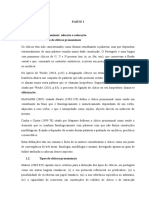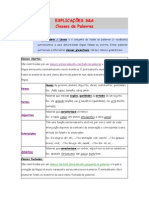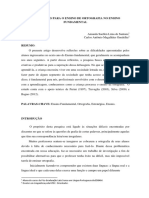Object Pronouns
Object Pronouns
Enviado por
Hugo LeonardoDireitos autorais:
Formatos disponíveis
Object Pronouns
Object Pronouns
Enviado por
Hugo LeonardoDireitos autorais
Formatos disponíveis
Compartilhar este documento
Compartilhar ou incorporar documento
Você considera este documento útil?
Este conteúdo é inapropriado?
Direitos autorais:
Formatos disponíveis
Object Pronouns
Object Pronouns
Enviado por
Hugo LeonardoDireitos autorais:
Formatos disponíveis
Object Pronouns.
Os pronomes objetos servem para substituir os objetos diretos ou indiretos. Eles sempre
devem vir aps verbos ou preposies.
Ex.:
I love Bob. (Eu amo o Bob).
or (ou)
I love him. (Eu o amo).
No exemplo acima, o pronome him deve ser utilizado, pois ele vem logo aps um verbo (love -
amar) e substitui um objeto direto, Bob. Outro caso quando o pronome usado para
substituir um objeto indireto, como em:
I bought these sunglasses to Lisa. (Eu comprei esses culos de sol para a Lisa).
Or (ou)
I bought these sunglasses to her. (Eu comprei esses culos de sol para ela).
Assim como em portugus no dizemos: Minha me comprou esse presente para eu e sim
Minha me comprou esse presente para mim; em ingls devemos seguir essa mesma regra.
Logo, no podemos dizer: My sister gave this chocolate to I (Minha irm deu este chocolate
para eu) e sim, My sister gave this chocolate to me. (Minha irm deu esse chocolate para
mim).
Segue abaixo uma tabela com os pronomes objetos:
Object Pronouns
1 pessoa do singular
me
2 pessoa do singular
you
3 pessoa do singular para o masculino
him
3 pessoa do singular para o feminino
her
3 pessoa do singular para animais ou objetos
it
1 pessoa do plural
us
2 pessoa do plural
you
3 pessoa do plural
them
Ex.:
Give me those books. (Me d aqueles livros).
Mariane called you yesterday morning. (Mariane te ligou ontem de manh).
Pass these folders to him, please. (Passe estas pastas para ele, por favor).
Mary gave her daughter a tricycle. (Mary deu a sua filha um triciclo).
She sends us some e-mails. (Ela nos enviou alguns e-mails).
They brought you a lot of gifts. (Eles trouxeram para vocs muitos presentes).
The teacher gave them a poor grade. (A professora deu a eles uma nota ruim).
Os object pronouns servem para substituir algum objeto em uma frase, para evitar a
repetio. Por exemplo:
- I bought flowers and gave the flowers to my girlfriend (Eu comprei flores e dei as flores para
minha namorada)
Para evitar que a palavra "flores" seja repetida, utilizamos o pronome de objeto "them":
- I bought flowers and gave them to my girlfriend (Eu comprei flores e as dei para minha
namorada)
Abaixo uma lista dos object pronouns:
I - Me
You - You
He - Him
She - Her
It - It
We - Us
You - You
They - Them
Pronomes de objetos podem ser utilizados como objetos diretos e objetos indiretos.
Caso o objeto indireto estiver antes do objeto direto, no se usa preposio (to, for):
- Give me the book
Ou, se o objeto indireto estiver depois do objeto direto, usaremos uma preposio:
- Give the book to me.
Object Pronoun
An object pronoun is not the subject of the sentence. It is usually the object that is affected in
some way by the subject of the sentence. It might be tricky to get a handle on this definition,
but you would be surprised to know just how many object pronouns you use in your everyday
life.
Defining an Object Pronoun
Lets break down just what an objective noun is, using an example sentence:
Mary ate the ice cream.
Mary is the subject of the sentence. The predicate is ate the ice cream. The verb is ate, and
the ice cream is the objective noun. Now, lets replace the ice cream with a pronoun to
make an object pronoun:
Mary ate it.
This sentence functions the same way as the first example sentence except it functions as
an object pronoun. Simply put, the pronoun is being affected in some way by the main noun,
or the subject, of the sentence. It shouldnt be too much more complicated than that. Got the
idea?
Subject vs. Object Pronoun
However, there is an important thing to note about the above example: it uses the word it.
This is all fine and well, except that it can be a normal subject pronoun as well as an object
pronoun.
Take for example the following two sentences:
It is my favorite book.
I like to read it.
In the first sentence, it functions as the subject pronoun. In the second sentence, it functions
as an object pronoun. Other pronouns do not work his way. Look at these sentences to see if
you can grasp this concept:
She is a wonderful person.
Emily wants to meet her.
In the first example sentence, she is a subject pronoun. In the second example, her seems
to be talking about the same person, but is a pronoun in a different case. In other words, it is
an object pronoun.
How to Make Object Pronouns
Most people are more familiar with subject pronouns than object pronouns. So, take an
subject pronoun, and select the appropriate object pronoun:
I becomes me,
You stays as you
he becomes him
she becomes her
it stays as it
they becomes them
Here is a sample paragraph that contains lots of subject and object pronouns. See if you can
point out the different pronouns and identify correctly if they are subject pronouns or object
pronouns! Ask a teacher or parent to check your work and help you correct your work.
Mary woke up and wanted to go to the store.
She walked out the door towards it, when she met them.
They said that it was good to see her.
Then she said goodbye to them, and ran into me, and told me all about it!
If you are having trouble memorizing which are which, make some flashcards and practice
determining which pronouns are which type, and see if you can rattle off the groups of
pronouns from memory.
Some people like to make up a game or song that helps them remember the object pronouns.
You might be able to find some of them online, but it can be easier to remember if you make
up the song yourself!
More Information About Object Pronouns
Object pronouns are an incredibly important part of the grammar of our everyday life. It is
important to understand which pronouns are which, because it can help you understand the
written language better.
It is incredibly easy to learn about object pronouns: just try reading the cover of todays
newspaper, and circling all the object pronouns you can find.
OBJECT PRONOUNS (Exercises)
Read and choose:
1) I can't see Mary. I can't see ________
a) him
b) she
c) her
2) Karen is next to Peter. Karen is next to ________
a) he
b) him
c) he
3) Can you help Peter and Ann? Can you help ________?
a) they
b) you
c) them
4) Drink your apple juice! Drink ________!
a) it
b) its
c) your
5) We are going to the cinema. Come with ________!
a) we
b) them
c) us
6) These are my bananas. You can't eat ________
a) they
b) them
c) it
7) Carol is at school. She can't come with ________
a) we
b) us
c) they
8) The cat is under the chair. Can you see __________?
a) he
b) she
c) it
9) Dave can't swim. Help ________!
a) him
b) her
c) he
10) It's Kate's birthday today. This is a present for ________
a) she
b) her
c) it
11) Where are you? I can't see ________
a) your
b) you
c) us
12) The windows are opened. Close ________
a) it
b) they
c) them
13) I can't ride a horse. Help ________!
a) I
b) me
c) it
Você também pode gostar
- Gênero ComentárioDocumento19 páginasGênero Comentáriomathssst27100% (1)
- Análise Estilísca Dos Poemas de Cecília MeirellesDocumento16 páginasAnálise Estilísca Dos Poemas de Cecília MeirellesHugo LeonardoAinda não há avaliações
- SINTAXE DO PERÍODO SIMPLES PPT ATD - Por - 3011X - CópiaDocumento74 páginasSINTAXE DO PERÍODO SIMPLES PPT ATD - Por - 3011X - CópiaANGELICA FUMUASSUCA83% (6)
- 61 Exercícios de Orações - Curso VetorDocumento6 páginas61 Exercícios de Orações - Curso VetorHanna ChristieAinda não há avaliações
- 2019 - CENSA - 8º Ano - INTRODUÇÃO À SINTAXE PDFDocumento20 páginas2019 - CENSA - 8º Ano - INTRODUÇÃO À SINTAXE PDFMaite FerreiraAinda não há avaliações
- UNIDADE Textos Jornalisticos 9 ClasseDocumento3 páginasUNIDADE Textos Jornalisticos 9 ClasseLuis ChinaiAinda não há avaliações
- Verbos - Teoria e Relações de Tempos Verbais.Documento7 páginasVerbos - Teoria e Relações de Tempos Verbais.nidia cecchettoAinda não há avaliações
- APOSTILA FONOLOGIA E FONETICA - Hélio 1º e 3ºDocumento14 páginasAPOSTILA FONOLOGIA E FONETICA - Hélio 1º e 3ºAxel RafaelAinda não há avaliações
- Inglês 9Documento2 páginasInglês 9Karine TiepoAinda não há avaliações
- Expansão de VocabulárioDocumento2 páginasExpansão de VocabulárioElse EmrichAinda não há avaliações
- Morfologia InflexionalDocumento14 páginasMorfologia InflexionalAndré LuisAinda não há avaliações
- Presente Simples em InglêsDocumento3 páginasPresente Simples em InglêsTatiane CaetanoAinda não há avaliações
- Pronomes Possessivos PDFDocumento2 páginasPronomes Possessivos PDFPatricia OliveiraAinda não há avaliações
- Divisao de Temas para Apresentacao SSPP IDocumento23 páginasDivisao de Temas para Apresentacao SSPP IXavier José DomingosAinda não há avaliações
- Formacao de PalavrasDocumento32 páginasFormacao de PalavrasÁngel Alonso García100% (1)
- Questions TagsDocumento6 páginasQuestions Tagsantonio miraAinda não há avaliações
- Aspectos VerbaisDocumento3 páginasAspectos VerbaisLuis Chinai100% (1)
- Nga MuturiDocumento6 páginasNga MuturiMychelle Simplicio0% (1)
- Orações Subordinadas - Toda MatériaDocumento1 páginaOrações Subordinadas - Toda MatériaSilva CumbeAinda não há avaliações
- Lingua PortuguesaDocumento7 páginasLingua PortuguesamahelyAinda não há avaliações
- Orações ReduzidasDocumento22 páginasOrações ReduzidasBruna RodriguesAinda não há avaliações
- Texto DramáticoDocumento26 páginasTexto DramáticoCristina RevezAinda não há avaliações
- A Tradução Vivida - Paulo RónaiDocumento12 páginasA Tradução Vivida - Paulo RónaiRaul FernandesAinda não há avaliações
- Frase e Não FraseDocumento2 páginasFrase e Não FraseAna Lucia GavetanhoAinda não há avaliações
- Estrutura Das PalavrasDocumento8 páginasEstrutura Das PalavrasGRAZIELLEAinda não há avaliações
- Estrutura Das Palavras - MorfemasDocumento18 páginasEstrutura Das Palavras - MorfemasWender Mothé100% (1)
- Tipos de PredicadoDocumento3 páginasTipos de PredicadoRicky RochaAinda não há avaliações
- Erros Comuns Do InglêsDocumento13 páginasErros Comuns Do InglêsRobertoAinda não há avaliações
- Concordância Nominal Mapa Mental Pai DéguaDocumento7 páginasConcordância Nominal Mapa Mental Pai DéguaS Junior100% (1)
- Plano de Aula-OralidadeDocumento3 páginasPlano de Aula-OralidadePriscilla Mazzucco CavalcanteAinda não há avaliações
- Diferenças Entre Texto Dramático e NarrativoDocumento1 páginaDiferenças Entre Texto Dramático e NarrativoGloria_DhiasAinda não há avaliações
- Texto NarrativoDocumento1 páginaTexto NarrativosofiaanesAinda não há avaliações
- 12 Figuras de LinguagemDocumento29 páginas12 Figuras de LinguagemJoel FélixAinda não há avaliações
- Possessive PronounsDocumento14 páginasPossessive Pronounsthaynara ferreira lopesAinda não há avaliações
- Plano de Aulas - Tópicos de Língua PortuguesaDocumento5 páginasPlano de Aulas - Tópicos de Língua PortuguesaPepe da Rua XAinda não há avaliações
- Orações Reduzidas: DefiniçãoDocumento5 páginasOrações Reduzidas: DefiniçãoderaseAinda não há avaliações
- Morfossintaxe (Resumo)Documento31 páginasMorfossintaxe (Resumo)Mirian Luck100% (1)
- Versificação PDFDocumento6 páginasVersificação PDFFelizardo CunzonzaAinda não há avaliações
- 8° Ano - ApostilaDocumento4 páginas8° Ano - ApostilaAnthony HorowitzAinda não há avaliações
- Trabalho de Língua Portuguesa-1Documento12 páginasTrabalho de Língua Portuguesa-1Delvas GLAinda não há avaliações
- Figuras de SintaxeDocumento16 páginasFiguras de Sintaxefabiopantoja100% (1)
- Prefixos e Sufixos Da Lingua Inglesa - 2Documento10 páginasPrefixos e Sufixos Da Lingua Inglesa - 2Mjdcmj MjdcmjAinda não há avaliações
- Ápostila de OrtografiaDocumento26 páginasÁpostila de OrtografiaCris Sgrancio SgrancioAinda não há avaliações
- Coesão e Coerência TextualDocumento5 páginasCoesão e Coerência TextualMonique ParenteAinda não há avaliações
- Anáfora, Catáfora, Endofórica, ExofóricaDocumento3 páginasAnáfora, Catáfora, Endofórica, ExofóricaAlberto MartinsAinda não há avaliações
- Verb To Be - Simple Present PastDocumento41 páginasVerb To Be - Simple Present PastHugoo MendonçaAinda não há avaliações
- Possessivos - Inglês PDFDocumento13 páginasPossessivos - Inglês PDFRenata RonaldoAinda não há avaliações
- VERBO Conceito Classificação e FlexãoDocumento5 páginasVERBO Conceito Classificação e FlexãoAnalina V. SipaúbaAinda não há avaliações
- Figuras de Estilo - GramáticaDocumento11 páginasFiguras de Estilo - GramáticaJaime thauzene MarrimeAinda não há avaliações
- O Que É GramáticaDocumento12 páginasO Que É Gramáticajfp1971100% (1)
- 35 Figuras de Linguagem - Resumo e Exemplos - Toda MatériaDocumento27 páginas35 Figuras de Linguagem - Resumo e Exemplos - Toda MatériaLeandro AP Instruções AutônomasAinda não há avaliações
- Aula 08 - Análise Sintática PDFDocumento2 páginasAula 08 - Análise Sintática PDFRonaldo Farias100% (1)
- Avaliação de SemânticaDocumento5 páginasAvaliação de SemânticabrmarceloalvesAinda não há avaliações
- Port. Classes Abertas e FechadasDocumento4 páginasPort. Classes Abertas e FechadasSara MartinsAinda não há avaliações
- Classes Gramaticais - As 10 Classes de Palavras - Norma CultaDocumento20 páginasClasses Gramaticais - As 10 Classes de Palavras - Norma CultaEugênio Rego100% (1)
- Texto Literario e Texto Não LiterarioDocumento3 páginasTexto Literario e Texto Não LiterarioAlex Sandes100% (1)
- MorfossintaxeDocumento19 páginasMorfossintaxegabriel1549846Ainda não há avaliações
- Ensino Da Ortografia No Ensino FundamentalDocumento14 páginasEnsino Da Ortografia No Ensino Fundamentalarley santana100% (1)
- Processos de Formação de PalavrasDocumento13 páginasProcessos de Formação de PalavrasLucasAinda não há avaliações
- Metodologias - Adaptado Do Texto Prof. Carlos LefaDocumento31 páginasMetodologias - Adaptado Do Texto Prof. Carlos LefaCandi A CastroAinda não há avaliações
- Acordo Ortográfico de 1990Documento15 páginasAcordo Ortográfico de 1990Jonatan TiagoAinda não há avaliações
- Ambiguidade em Tirinhas PDFDocumento26 páginasAmbiguidade em Tirinhas PDFHugo LeonardoAinda não há avaliações
- Professor de Portugues - Classe B-Prova PDFDocumento17 páginasProfessor de Portugues - Classe B-Prova PDFHugo LeonardoAinda não há avaliações
- Semântica e Pragmática-Caderno-gabarito PDFDocumento22 páginasSemântica e Pragmática-Caderno-gabarito PDFHugo LeonardoAinda não há avaliações
- Semântica PolissemiaDocumento24 páginasSemântica PolissemiaHugo LeonardoAinda não há avaliações
- ProsódiaDocumento7 páginasProsódiaHugo LeonardoAinda não há avaliações
- IDIBDocumento1 páginaIDIBHugo LeonardoAinda não há avaliações
- 2EM GramaticaDocumento7 páginas2EM GramaticaHugo LeonardoAinda não há avaliações
- Interpretação e Compreensão de TextoDocumento7 páginasInterpretação e Compreensão de TextoHugo LeonardoAinda não há avaliações
- Questões Português LiteraturaDocumento513 páginasQuestões Português LiteraturaLauro Rafael Lima80% (81)
- SimuladoENEM 2013 Prova02Documento24 páginasSimuladoENEM 2013 Prova02Hugo Leonardo0% (1)
- Objetos Direto e IndiretoDocumento3 páginasObjetos Direto e IndiretoBianca SuellenAinda não há avaliações
- Aula 17. Sintaxe II Frase, Oração e Período.Documento66 páginasAula 17. Sintaxe II Frase, Oração e Período.Héber ValverdeAinda não há avaliações
- DGR65!FDocumento14 páginasDGR65!FRenata JackelineAinda não há avaliações
- Lisboa Walter - Gramática LatinaDocumento61 páginasLisboa Walter - Gramática LatinaPedro HenriqueAinda não há avaliações
- Exercícios Sintaxe SimplesDocumento5 páginasExercícios Sintaxe SimplesBianca GuedesAinda não há avaliações
- Concordancia Regencia Colocacao Crase e Pontuacao 1Documento113 páginasConcordancia Regencia Colocacao Crase e Pontuacao 1Eduarda100% (1)
- Lista de Exercícios ExtrasDocumento10 páginasLista de Exercícios ExtrasMariana TorresAinda não há avaliações
- Cesd 2006Documento9 páginasCesd 2006Maxwell MoraesAinda não há avaliações
- 01 Apostila de Portugues em 2 AnoDocumento35 páginas01 Apostila de Portugues em 2 AnoFlavioBarbieriAinda não há avaliações
- AVALIAÇÃO DE LÍNGUA PORTUGUESA 3O ANO Termos IntegrantesDocumento3 páginasAVALIAÇÃO DE LÍNGUA PORTUGUESA 3O ANO Termos IntegrantesFausto Muniz JuniorAinda não há avaliações
- 6041107Documento61 páginas6041107Gabriel Cristovao GuedesAinda não há avaliações
- Slide Transitividade Verbal PDFDocumento30 páginasSlide Transitividade Verbal PDFGabriel Ribeiro100% (1)
- Apresentação Transitividade VerbalDocumento13 páginasApresentação Transitividade VerbalLino Cunha SilvaAinda não há avaliações
- Aula de Recuperação 3 Língua PortuguesaDocumento1 páginaAula de Recuperação 3 Língua PortuguesaNelma RodriguesAinda não há avaliações
- Portugues FCC Provas Comentadas - Decio Sena - 3a Ed. 2010Documento448 páginasPortugues FCC Provas Comentadas - Decio Sena - 3a Ed. 2010Sirlene GuimarãesAinda não há avaliações
- 06 Lingua Inglesa PDFDocumento136 páginas06 Lingua Inglesa PDFlwymax3150Ainda não há avaliações
- Aula 08 - Sintaxe de Regência e Emprego Da Crase: Língua Portuguesa P/ Polícia FederalDocumento125 páginasAula 08 - Sintaxe de Regência e Emprego Da Crase: Língua Portuguesa P/ Polícia FederalWilliamAinda não há avaliações
- Os Pronomes Oblíquos (Não - Primeiro Rever Tudo)Documento4 páginasOs Pronomes Oblíquos (Não - Primeiro Rever Tudo)Alberto MartinsAinda não há avaliações
- Plano de Filosofia e Sociologia 2 Ano MedioDocumento2 páginasPlano de Filosofia e Sociologia 2 Ano MedioRegis da SilvaAinda não há avaliações
- Português - Análise Sintática - Exercícios e Testes Com Gabarito - Portal EscolaDocumento4 páginasPortuguês - Análise Sintática - Exercícios e Testes Com Gabarito - Portal EscolaRaisson Holanda100% (2)
- Tipos de Predicado - Meet de 11 - 05 - 21Documento6 páginasTipos de Predicado - Meet de 11 - 05 - 21minhavidanoavakinAinda não há avaliações
- A Transitividade Segundo A Tradição Gramatical e o Funcionalismo PDFDocumento11 páginasA Transitividade Segundo A Tradição Gramatical e o Funcionalismo PDFVictor Castilho BorgesAinda não há avaliações
- Curso 86473 Aula 02 v4 PDFDocumento84 páginasCurso 86473 Aula 02 v4 PDFPedro AraujoAinda não há avaliações
- Sintaxe Atividade 3anoDocumento3 páginasSintaxe Atividade 3anoEmanuele Anjos ManuAinda não há avaliações
- MMX Banco Do Brasil Rodada 4Documento47 páginasMMX Banco Do Brasil Rodada 4Carlos LimaAinda não há avaliações
- Atividade TransitividadeDocumento2 páginasAtividade TransitividadeMércia Medeiros100% (1)
- Atividade de Revisão 8º Ano PortuguêsDocumento2 páginasAtividade de Revisão 8º Ano Portuguêsprof.CAMILA LACERDA100% (1)




































































































